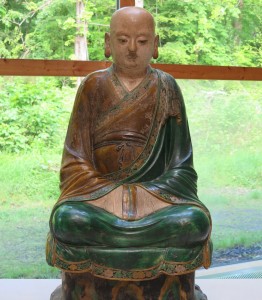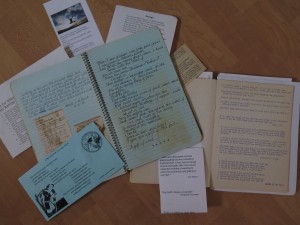 Someone recently remarked – with what sounded like a good deal of irritation – that the little slips of paper in fortune cookies are no longer fortunes, they are aphorisms. Personally, I hadn’t noticed because I am still carrying the fortune (not aphorism) I received five years ago that promises, ‘You will receive some prestigious prize or award.’ I’m waiting (I can’t say breathlessly, but certainly with eager anticipation) for a call from Stockholm.
Someone recently remarked – with what sounded like a good deal of irritation – that the little slips of paper in fortune cookies are no longer fortunes, they are aphorisms. Personally, I hadn’t noticed because I am still carrying the fortune (not aphorism) I received five years ago that promises, ‘You will receive some prestigious prize or award.’ I’m waiting (I can’t say breathlessly, but certainly with eager anticipation) for a call from Stockholm.
Meanwhile, I started to pay attention and it turns out that the vast majority of my recent fortune cookie papers do, indeed, contain aphorisms or maxims or pithy reminders to get with the program. Now, you may not consider fortune cookie fillers wisdom, but I will take my wisdom wherever I can get it. I certainly don’t limit myself to Chinese restaurants as places of counsel, but I think if we are going to benefit from the wisdom the universe offers, we need to be willing to take it in small doses as well as in huge gulps.
So, I invite you to join me this week in the spiritual discipline of noticing the small (and large) offerings of wisdom that have blessed your life. Perhaps these offerings encouraged you in a time of trial, or inspired you when you were depressed, or recalled you to your best self when you had been tempted to behave in less than stellar ways. Maybe one of them nudged you to take yourself less seriously…or more seriously.
Many many years ago (more than I can actually remember), I started a commonplace book. I don’t know how familiar this term is in other parts of the country, but it is an old New England tradition dating back a couple of centuries at least. The book is so called because it is the ‘common place’ in which one gathers advice, favorite quotations, maxims, proverbs, and aphorisms. My book is now thick with carefully copied quotes as well as hastily torn-out bits of newsprint or magazine pages, unattributed words scrawled in a friend’s handwriting, and (yes) some fortune cookie fillers. My father gave me a second book with his favorite bits of wisdom, gleaned from his hard-drive (which is where he stores them) – my father is more tech-savvy than I am.
 If you have one, I invite you to dig out your own commonplace book (whatever you called it, in whatever form it took) or to put a pad of paper beside your bed, or on your dining table, or in your study. Each day write down at least one piece of wisdom you remember from the past. Don’t get too hung up on this. Try not to self-censor (This means avoiding thoughts like, “Do I really consider this wisdom?” or “Does this reflect well on my wisdom-aesthetic?” or any other thing that will stop you in your tracks.) You can start with the obvious. Just because it is obvious doesn’t mean it isn’t wise. “Make do or do without” is a perfectly good place to begin. So is “Necessity is the mother of invention.” If your remembered wisdom is slightly less obvious (“We do not see things as they are; we see things as we are.” The Talmud), go for it. Personally, I still cherish Speakman-Felmet’s Rule of Thumb: Never stand under a tall dog.
If you have one, I invite you to dig out your own commonplace book (whatever you called it, in whatever form it took) or to put a pad of paper beside your bed, or on your dining table, or in your study. Each day write down at least one piece of wisdom you remember from the past. Don’t get too hung up on this. Try not to self-censor (This means avoiding thoughts like, “Do I really consider this wisdom?” or “Does this reflect well on my wisdom-aesthetic?” or any other thing that will stop you in your tracks.) You can start with the obvious. Just because it is obvious doesn’t mean it isn’t wise. “Make do or do without” is a perfectly good place to begin. So is “Necessity is the mother of invention.” If your remembered wisdom is slightly less obvious (“We do not see things as they are; we see things as we are.” The Talmud), go for it. Personally, I still cherish Speakman-Felmet’s Rule of Thumb: Never stand under a tall dog.
You have absorbed wisdom (perhaps without realizing it) from a parent or grand-parent, a mentor, a colleague. Or a stranger on a bus, a clerk in the grocery store, the janitor of your junior high school. Or one of your children (whether that is a student, a daughter or son, a niece or nephew, a neighbor). From an author, a minister, a nurse, an artist, the crotchety old man who shook his cane at you when you walked across his lawn as a child. I invite you to gather that wisdom. Don’t worry too much about the exact words; it’s how you remember them and live them that matters.
The wisdom we receive – consciously or unconsciously – shapes us, strengthens us, transforms us, comforts us, teaches us, stretches us, and grounds us. In this time of harvest, it is worth taking the time to be grateful for it.
 And then I invite you to do something else. I invite you to begin writing down the wisdom you would like to leave for others. I invite you to ponder what you have distilled from the particular experiences of your life: the sorrows and miracles, the love and the fear, the mistakes, the learning curves, the work and the leisure, the accidents, the struggles. I invite you to consider what wisdom you may have learned from your anger, your happiness, your generosity, your poverty, your humor, your despair. What words can you leave for someone else to find, someday, as a lifeline, or an ‘aha’, or an act of compassion?
And then I invite you to do something else. I invite you to begin writing down the wisdom you would like to leave for others. I invite you to ponder what you have distilled from the particular experiences of your life: the sorrows and miracles, the love and the fear, the mistakes, the learning curves, the work and the leisure, the accidents, the struggles. I invite you to consider what wisdom you may have learned from your anger, your happiness, your generosity, your poverty, your humor, your despair. What words can you leave for someone else to find, someday, as a lifeline, or an ‘aha’, or an act of compassion?
Many of the seeds planted by others have grown in us, yielding many fold.
May you share that bounty with an open hand and an open heart.
–Andrea
Text © 2015, Andrea La Sonde Anastos
Photos © 2015 Immram Chara, LLC
NOTE: All three sets of Lughnasadh cards are up on the website Store [click here]. They can be ordered from my Etsy shop [click here]. If you missed the Lughnasadh Give-Away information, you can find it by clicking here and scrolling down through the blog.
A really good idea – I will start my own book.
It doesn’t need to be anything fancy…or it can be as fancy and spectacular as you like. Both of mine are falling apart and some of the glue I used has made the quotes on newsprint unreadable. I find it kind of interesting to see what my handwriting was like at different times. The oldest book I have was started in 1971, but I had copied into it a number of things that I had collected earlier because some of those are dated earlier than 1971, or there is a little note saying where I got them.
Good luck and enjoy.
Andrea